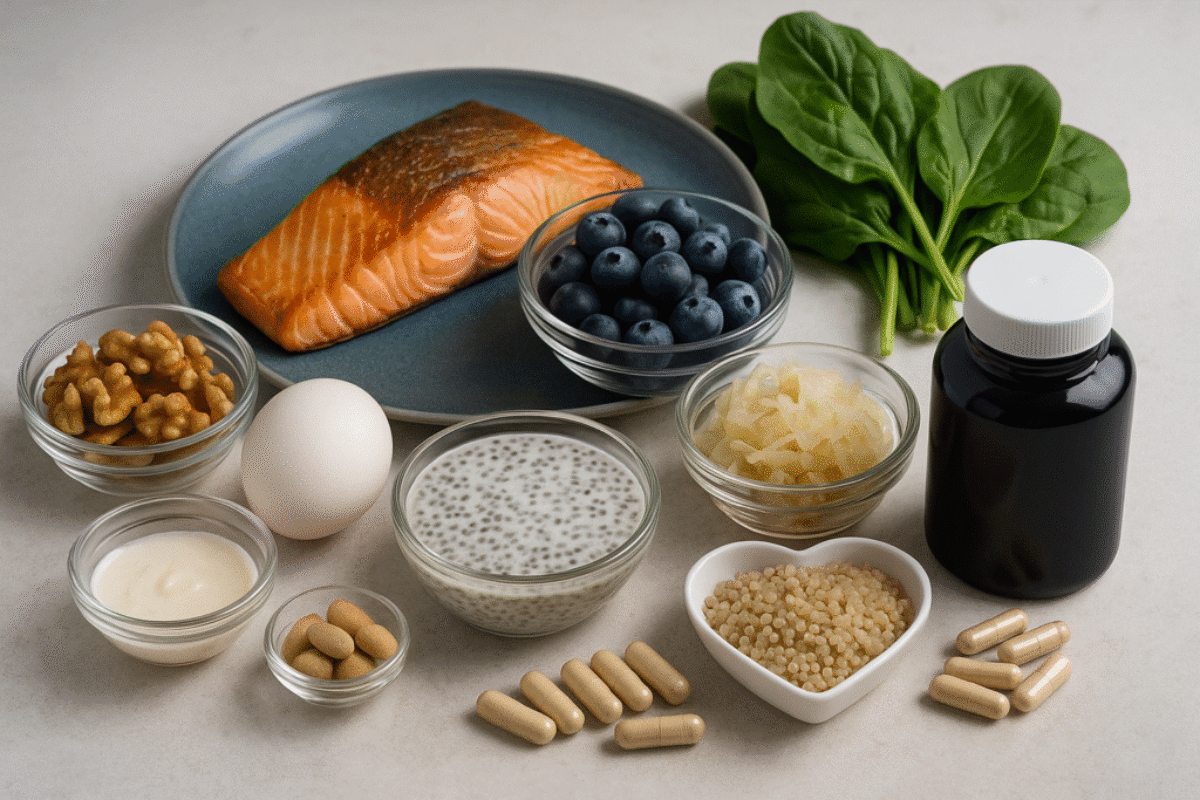The Ultimate Guide for peak Brain Health: Rewire Your Diet for Peak Cognition
Have you ever wondered why you crave sugary snacks but recoil at salmon? Or why some foods leave you focused while others cause brain fog? Neuroscience reveals that foods for brain health directly shape your brain’s structure, function, and even your cravings. In this Huberman Lab breakdown, neurobiologist Dr. Andrew Huberman unpacks how specific nutrients boost neuron health, enhance focus, and protect against cognitive decline. By the end, you’ll know exactly which brain-healthy foods your neurons crave—and how to make them irresistible.
What Are the Essential Foods for Brain Health?
Foods for brain health target compounds that directly support neuron structure and cognition, unlike generic “healthy eating.” They provide:
-
Structural fats for neuronal membranes (60% of your brain’s dry weight).
-
Neuromodulators like acetylcholine for focus.
-
Antioxidants that reduce inflammation-linked cognitive decline.
Ignoring these sabotages mental clarity, while optimizing them sharpens memory and focus long-term.
The Science: How Brain Foods Rewire Your Mind
Dr. Huberman reveals three pillars driving food choices:
-
Gut-brain signaling: Neuropod cells detect nutrients (fats/sugars) and trigger dopamine releases that subconsciously drive cravings.
-
Metabolic accessibility: Your brain prioritizes brain foods efficiently converted to energy (e.g., glucose or ketones).
-
Belief effects: Thinking “This salmon will sharpen my focus” alters insulin response and enjoyment, per Stanford studies.
Critically, pairing “meh” foods for brain health (like kale) with metabolism-boosting compounds (e.g., sweet potatoes) rewires dopamine pathways in 7–14 days.
7 Actionable Ways to Eat More Brain Foods
1. Prioritize Omega-3s for Brain Structure
Why: EPA/DHA form neuron membranes. Low levels impair memory and increase depression risk by 30%.
How:
-
Fatty fish (salmon/mackerel): 2–3x/week.
-
Vegan? Algae oil + chia seeds.
-
Dose: 1–3g EPA daily.
2. Harness Phosphatidylserine for Cognition
Why: This phospholipid improves verbal learning and slows cognitive decline.
How:
-
Oysters, sauerkraut, or supplements.
-
Dose: 300mg/day.
3. Fuel Focus with Choline-Rich Foods
Why: Choline builds acetylcholine—the “focus neuromodulator.”
How:
-
Egg yolks (2–3/day), potatoes, or alpha-GPC supplements.
-
Dose: 500mg–1g daily.
4. Creatine: The Overlooked Brain Food
Why: Powers frontal cortex circuits, boosting memory and mood.
How:
-
Beef (grass-fed) or creatine monohydrate (5g/day).
5. Eat Anthocyanin Brain Foods Daily
Why: Blueberries/blackberries reduce DNA damage and enhance verbal memory by 24% in elderly adults.
How: 1–2 cups fresh or 400mg extract.
6. Glutamine for Gut-Brain Harmony
Why: Offsets cognitive deficits from sleep apnea and reduces sugar cravings.
How: Spinach, parsley, or supplements (1–10g/day).
7. Fermented Brain Foods for Gut Neurons
Why: Sauerkraut/kimchi (2–4 servings/day) improve neuropod cell signaling for healthier cravings.
Avoid These Brain Food Pitfalls
Q: Do artificial sweeteners harm brain health?
A: Only if consumed with carbs. Diet soda + meal spikes insulin—drink it alone to avoid risks.
Q: Can plant-based diets support brain health?
A: Absolutely! Pair chia seeds with bell peppers (vitamin C boosts omega-3 absorption).
Q: How quickly can I rewire cravings for brain foods?
A: Pair disliked brain-healthy foods (kale) with metabolism-boosters (sweet potatoes) for 7–14 days.
Q: What’s the #1 food killing cognition?
A: Ultra-processed “hidden sugar” foods hijack gut neurons, creating addictive loops.
Q: Are fish oil supplements effective?
A: Yes—but choose triglyceride-form oils (3x better absorbed than ethyl ester).
Conclusion
Prioritizing foods for brain health—like omega-3s, berries, and choline—builds resilient neurons and sharpens cognition. But the real magic lies in using neuroscience to enjoy them. Start with one action: Add blueberries to breakfast or take omega-3s. For more science-backed protocols, explore our Neuroplasticity Super Protocol.



September 18, 2025 @ 11:35 AM
Your writing encourages mindful engagement, prompting the reader to pause, observe, and consider each idea carefully, cultivating thoughtfulness and reflection.
October 13, 2025 @ 2:50 PM
Valuable info. Lucky me I found your web site by accident, and I’m shocked why this accident didn’t happened earlier! I bookmarked it.